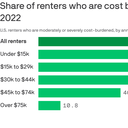Housing was wildly unaffordable for half of renters in 2022, report shows

Half of all renters in the U.S. were burdened by the cost of their rent in 2022, a report released by the Harvard Joint Center for Housing Studies this week found.
Why it matters: The increasing lack of affordable housing over the past few years has plagued millions of people across the country, just as homelessness reached an all-time high last year.
Meanwhile, soaring home prices and mortgage rates pushed homeownership increasingly out of reach.
What they found: An extended period of rising rent prices during the COVID-19 pandemic "put unaffordability at an all-time high," researchers said.
- The financial strain was felt across the income spectrum, with the share of cost-burdened renters rising to 50%.
- But the burden rose the most for middle-income renter households earning between $30,000 and $74,999 annually.
By the numbers: The number of renter households spending more than 30% of their income on rent and utilities rose by 2 million in three years to a record high of 22.4 million, according to the study.
- Among them, 12.1 million people paid over half of their income for housing, with housing costs also at an all-time high.
Yes, but rent hikes have almost completely stopped after historically high increases in 2021 and 2022 during the COVID-19 pandemic, researchers said.
- In the third quarter of 2023, rent for professionally managed apartments fell to just 0.4% — down from 15.3% in early 2022.
- "This abrupt deceleration was geographically widespread, with rents even falling in some markets," lead author of the report Whitney Airgood-Obrycki said. "While the slowdown is a welcome change for renters, asking rents still remain well above pre-pandemic levels."
Between the lines: Rent increases are significantly outpacing income gains.
- In 2022, median rents were 21% higher than they were in 2001. During the same period, renters' incomes have risen just 2%.
The bottom line: Increased resources for renters during the pandemic "demonstrated that financial assistance and supports keep tenants stably housed and landlords solvent," researchers concluded.
- "As these resources have expired, however, the housing safety net is once again overwhelmed and underfunded," Chris Herbert, managing director of the Harvard Joint Center for Housing Studies, said.
Go deeper: Why renters are feeling worse about their finances than homeowners